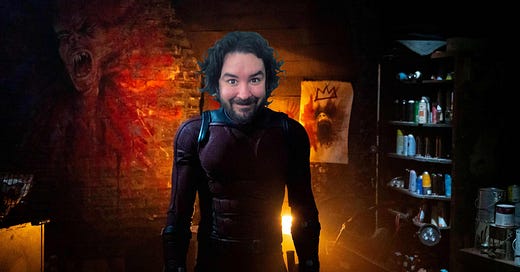Superhero Shows Can’t Be Dad Shows Because They’re Inherently Childish
But 'Daredevil: Born Again' comes unusually close
Listen, I’m not saying superhero movies and shows are inherently bad. I admit “childish” is a loaded word to use in a headline, but it doesn’t have to be negative. It can mean “related or appropriate to children,” and that’s how I mean it. It’s good that there are movies and shows that are accessible to both kids and adults. Some superhero things are good, and a lot of them are fine. It’s bad that they swallowed Hollywood the way they did, but that couldn’t have happened if they didn’t work. The thing I am saying is that common elements of the superhero genre — moral simplicity, bright colors, corny quips, etc. — are designed to appeal to children, and Dad Shows are not for children.
Dad Shows are about characters with recognizably human problems. Dad Show protagonists aren’t trying to save the world, they’re trying to protect their own family from the world. The size of that family can get pretty big, but the character’s area of responsibility is pretty small. And they don’t have superpowers, or wealth that allows them to buy superpowers. Even heightened Dad Shows tend to be set in a version of the real world, where not even Jeff Bezos has an Iron Man suit.
Daredevil — the original Netflix version and the new Born Again revival on Disney+ — is as close to a Dad Show as superhero stuff gets, but it’s not quite. Just when it gets close to being a gritty New York crime drama, one of the purest Dad Show genres there is, someone shows up in a mask and unitard and turns it back into fantasy.
I like Daredevil: Born Again. I appreciate that it’s committed to feeling like a gritty New York crime drama. Usually when promoters want you to believe that their superhero projects are like “‘70s thrillers” or “A24 movies” or other pieces of cinema (I’m on Marty’s side of that debate, obviously), it’s bullshit. But Daredevil has so many elements that make it feel like a real crime drama: The location shooting that integrates it with the city; the procedural-ish format; the hard-hitting violence; the timely ripped-from-the-headlines corruption inspired by Donald Trump and Eric Adams; the human-sized themes.
That last item is what truly makes it almost a Dad Show. Matt Murdock is fighting for his friends, his clients, and his neighborhood. Murdock is trying to save his world, not the world. Saving the world is for the Avengers, and other children’s stories like Harry Potter and Star Wars. Dad Shows have more grounded stakes.
But Murdock does have superpowers, which means he’s not a Dad Show hero. He has super-hearing and super-agility and super-strength and puts on a tight costume to go out and fight crime. He’s not that different from Jack Reacher, who’s super-strong and super-smart and generally super-heightened, but Reacher is a Dad Show icon and Murdock is not because Reacher is more cynical (in the just-released finale, a character points out that Reacher doesn’t really care about sticking up for the little guy, he just hates the big guy), uses guns, and wears t-shirts and jeans instead of a helmet with little devil horns. Reacher is a crime drama, not a superhero show with crime drama elements. It’s a simplistic distinction, but simplicity is important to Dad Shows.
Daredevil isn’t for children, but it’s more for children than the Harvey Keitel movies it’s influenced by. And it would make me happy if a 15-year-old watching Daredevil today seeks out Mean Streets tomorrow because they want to watch something that’s really, actually about Catholic guilt and New York City.
If you’ve been watching Reacher Season 3, you’ve been waiting for Reacher and 7-foot-tall henchman Paulie to throw down. Well, the moment has arrived in the season finale. For Men’s Health, I talked to Olivier Richters, who plays Paulie, about all of his fight scenes, including the climactic one, which he says was inspired by Peter Griffin vs. the chicken on Family Guy. It’s one of my favorite interviews I’ve done maybe ever. Here’s a sample:
MH: How many calories per day did you eat?
OR: There were seven meals, each around 1,000 calories. I ate between 400-500 grams of protein a day, which ended up being 7,000 calories. I don't know if this is the right way to put it, but I felt sometimes like a goose, because if you have to eat another 1,000 calories after training, the easiest way is drinking oat shakes, and that was just clocking it [imitates being force-fed]. But it's what the body needed. If you don't do it then you break down. So just to give you a rough idea, I eat 16 eggs a day, 800 grams of meat, one kilo of Greek yogurt, the protein powders, and so much oats. So much oats. It's a thing I don't advise anyone else to do, but not everybody has to beat Reacher.






Remember when the Russos claimed The Winter Soldier was basically The Parallax View? 🙄
The explosion of superhero culture has infantilized a whole lot of “adult” men.